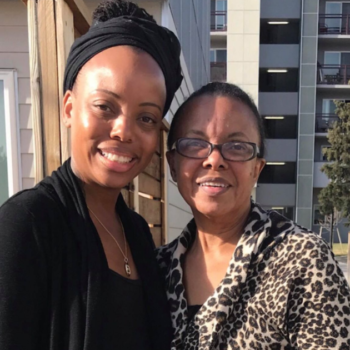Ralonda Thompson

I thought maybe she was just stressed because she had a series of terrible life events happen in an eight-month period: Her mother passed away, she lost her sister to cancer, and her husband, who became ill from a tick bite he got on a hike, also died. Then she lost her job.
May 18th, 2018
Ralonda Thompson is a full-time caregiver to her mother, who was diagnosed with dementia two years ago.
From the outside, my mother seemed to be thriving in her late 50s. She worked for the healthcare company Kaiser for about 32 years and had just finished her master’s degree in business informatics. Then she started struggling at work and on the computer. I thought maybe she was just stressed because she had a series of terrible life events happen in an eight-month period: Her mother passed away, she lost her sister to cancer, and her husband, who became ill from a tick bite he got on a hike, also died. Then she lost her job. I knew something wasn’t right when I called her and the house phone she had for more than 40 years was disconnected. When I visited her house and checked her mail, I saw that she was not keeping up with her bills. At that point, I requested an appointment with the doctor. My mother scored low on the tests she was given at the doctor’s office and was officially diagnosed with early-onset dementia at 60 years old.
If you want to be an assertive healthcare representative for your parent, you should remember that you’re now the one who’s advocating for your loved one because your parent can’t advocate for themselves anymore. I work for a company in Colorado that is one of the leaders in dementia care and have held several positions within that company. While I have worked with dementia and memory care clients for the past seven years, having to deal with a dementia diagnosis on a personal level has been completely different because I’m not detached from the experience. However, my experiences at work and at home have taught me that because my mom can’t vocalize what she’s feeling or what may be hurting, I need to make sure that I do that for her. I know my mom’s personality, what she would ask and want to know more information about. I think it’s important to do thorough research on different aspects of the disease so that you make sure your loved one is getting the proper care and attention that they deserve.
Part of being assertive and helping your loved one means asking the right questions. I have a journal, and from the last doctor’s appointment to the next one, I jot down questions that I feel I need to ask the doctor. I write down questions about different behaviors, changes in appetite, sleeping habits or how her medication may be affecting her. This way, when I go to an upcoming appointment with my journal, I have a list that helps me remember what to ask; you never know what mood you may be in or if something’s going on that may cause you to forget to tell the doctor something important.
I believe caregivers should also encourage their relatives to spend time with a loved one who has dementia. While relatives may accept a diagnosis, they may not know what to expect and brush off the symptoms that come with a diagnosis. It’s one thing for me to tell my relatives that my mom has been acting a little different, but I also like to make sure they have hands-on experiences with her so that they can see for themselves what I’m talking about. I signed up for the Alzheimer’s Association in my area and get a lot of pamphlets from them. I make handouts about different information that I think is important for my relatives to know more about. I also printed out business cards to give to my neighbors; they have my mom’s picture in the corner, my contact information, text that says “Dementia Alert” and a little message that says if they see her acting out of the ordinary, please be kind to her and contact me, as she has dementia.
Caregivers have to be patient and kind. Although our loved ones can’t always verbalize how they feel, their feelings may still be hurt by something that we say and they pick up on our energy. Our loved ones may have this disease for 15–20 years or more, so we have to make sure we’re providing proper care. The biggest thing I have mastered is my patience. I’m still working on it, but I’ve realized that this is not who my mom chooses to be or the condition that she chooses to be in. The disease is causing these changes.